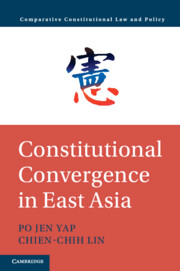Refine search
Actions for selected content:
8 results
12 - Implied freedom of political communication
- from Part 3 - Limitations on powers
-
- Book:
- Australian Constitutional Law
- Published online:
- 14 December 2023
- Print publication:
- 04 January 2024, pp 322-361
-
- Chapter
- Export citation
6 - Conclusion
-
- Book:
- Constitutional Convergence in East Asia
- Published online:
- 18 November 2021
- Print publication:
- 25 November 2021, pp 172-178
-
- Chapter
- Export citation
3 - Convergence on Structured Proportionality
-
- Book:
- Constitutional Convergence in East Asia
- Published online:
- 18 November 2021
- Print publication:
- 25 November 2021, pp 62-109
-
- Chapter
- Export citation
1 - Introduction
-
- Book:
- Constitutional Convergence in East Asia
- Published online:
- 18 November 2021
- Print publication:
- 25 November 2021, pp 1-24
-
- Chapter
- Export citation

Constitutional Convergence in East Asia
-
- Published online:
- 18 November 2021
- Print publication:
- 25 November 2021
2 - More Structure, More Deference
- from Part I - Structured Proportionality
-
-
- Book:
- Proportionality in Asia
- Published online:
- 18 September 2020
- Print publication:
- 27 August 2020, pp 25-59
-
- Chapter
- Export citation
3 - Proportionality in Taiwan
- from Part I - Structured Proportionality
-
-
- Book:
- Proportionality in Asia
- Published online:
- 18 September 2020
- Print publication:
- 27 August 2020, pp 60-80
-
- Chapter
- Export citation
4 - Proportionality in South Korea
- from Part I - Structured Proportionality
-
-
- Book:
- Proportionality in Asia
- Published online:
- 18 September 2020
- Print publication:
- 27 August 2020, pp 81-102
-
- Chapter
- Export citation
